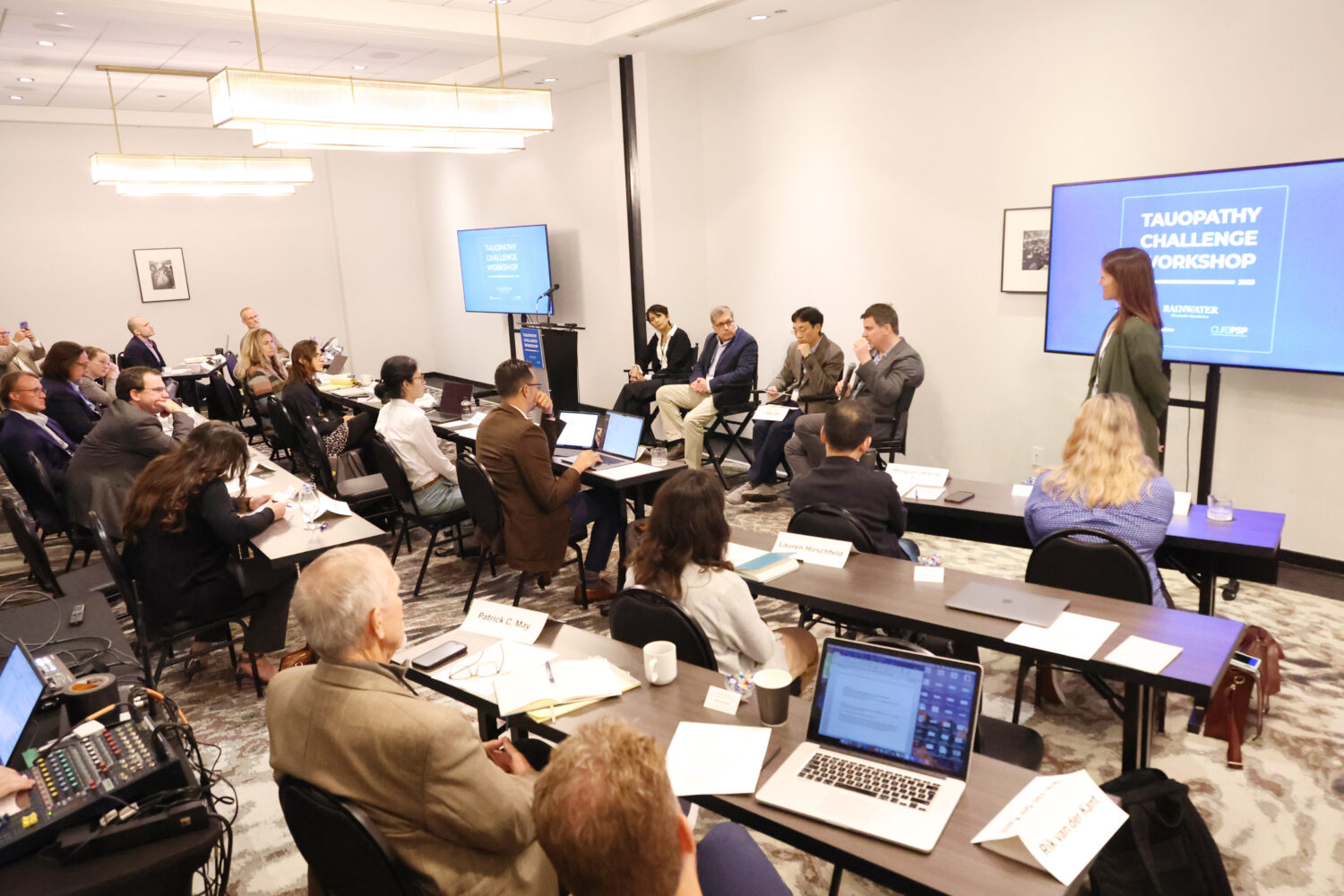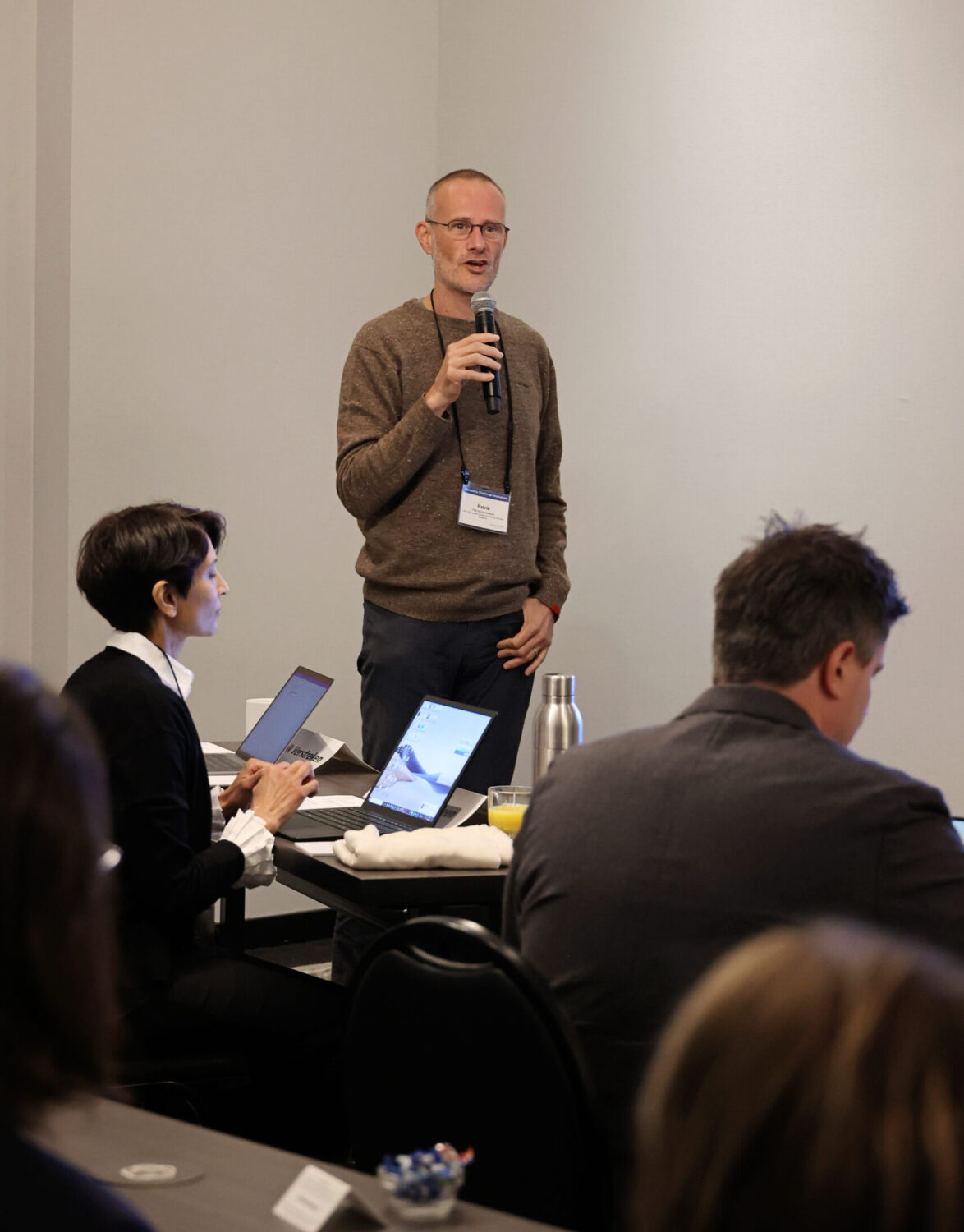Imagine a room filled with the brightest minds in neurodegenerative research collaborating to one day unlock the mysteries of primary tauopathies. Our inaugural 2023 Tauopathy Challenge Workshop did just that. Primary tauopathies, a group of devastating diseases including Progressive Supranuclear Palsy and Frontotemporal Dementias, rob patients of their memories and independence. Their root causes remain elusive.
Current research is yielding valuable insights, but hasn’t delivered the breakthroughs the field desperately needs. The Rainwater Charitable Foundation (RCF) created a new workshop paradigm to bring forward fresh perspectives and innovative ideas. The inaugural workshop additionally benefited from the funding support and expertise of two leading nonprofits, CurePSP and the Aging Mind Foundation.
The inaugural Tauopathy Challenge Workshop, held in Chicago, assembled investigators from diverse fields – neuroscience, genetics, biochemistry, biophysics and more – to learn from each other and challenge our collective understanding about the mechanisms of tau pathology. Through facilitated discussions and brainstorming sessions, researchers explored unconventional theories and proposed bold new scientific directions.
By fostering collaboration across disciplines, we hope to spark innovative ideas that traditional research has overlooked. We anticipate that this workshop will become an incubator for groundbreaking research proposals, leading to faster diagnoses, better treatments, and ultimately a cure for primary tauopathies.
We are thrilled to announce the 2023 group of winners and report on their research proposals:

- “Understanding the Role of Astrocytic Tau Accumulation On Glial and Neuronal Health In PSP.”
- Investigator: Kathryn Bowles, PhD, UK Dementia Research Institute at the Univ. of Edinburgh
- “Decoding Tau Post-Translational Modifications In PSP and FTDs.”
- Yongku Cho, PhD, Dept. of Chemical and Biomolecular Engineering at the Univ. of Connecticut, and co-PI Jesse Rinehart, PhD, Dept. of Cellular & Molecular Physiology at the Yale Univ. School of Medicine with a joint appointment in the Systems Biology Inst.
- “Understanding and Targeting Lipid Dyshomeostasis In Tauopathies.”
- Rik van der Kant, PhD, Alzheimer Center Amsterdam Univ. Medical Center and Center for Neurogenomics and Cognitive Research at VU Univ. Amsterdam
- “Targeting Synaptic Tau – Learning From Hibernating Animals.”
- Patrik Verstreken, PhD, VIB-KU Leuven Center for Brain & Disease Research
Program Deep Dive:
Patrik Verstreken, PhD, VIB-KU Leuven Center for Brain & Disease Research, “Targeting Synaptic Tau – Learning From Hibernating Animals.”

Brain connections, called synapses, are vital to thinking clearly and retaining memories. When these connections weaken or break down, it can lead to memory problems and many brain diseases. Dr. Verstreken’s research focuses on how synapses normally function, how they become damaged, and how they can be repaired to counter neurodegeneration. Dr. Verstreken is particularly interested in how healthy tau protein becomes tangled and pathologic in patients afflicted with dementia.
Dr. Verstreken has devoted his career to unraveling the mysteries of brain communication. As Science Director at VIB-KU Leuven Center for Brain & Disease Research, he has built a thriving, international research group dedicated to understanding how neurons talk to each other and how this vital process goes awry in neurodegenerative diseases like Alzheimer’s disease and Parkinson’s disease. His work has not only yielded promising drug targets and industry partnerships, but has also influenced a new generation of researchers.
Dr. Verstreken’s current research was inspired by a curious phenomenon of animal biology. Some mammals, like hibernating hamsters, experience similar tau pathologies as humans, yet their brains recover when they wake up. The tau found in hibernating mammals resembles dysfunctional tau in humans with dementia. However, unlike humans with dementia, the hibernating hamsters’ damaged connections are repaired and the diseased tau is “rescued.”
Dr. Verstreken plans to study how hibernating hamsters rebuild their brains and restore healthy synaptic function after hibernation. By understanding this process, we might be able to find ways to protect synapses from tau damage in humans. Dr. Verstreken’s novel use of multi-omic techniques with animal models could one day be pivotal in developing new treatments for human dementia patients.
To discover more about our next Tauopathy Challenge Workshop in 2025, please visit our webpage.

